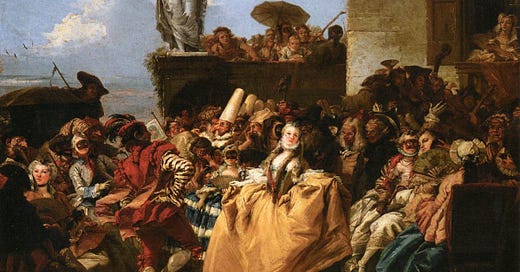Our Lord is left alone during carnival
By St. Alphonsus Liguori - Our Lord is, especially in these days of carnival, left alone by ungrateful men and as if reduced to extreme poverty
Note from the translator: When reading this text from Saint Alphonsus Liguori remember it was written in the 1700s. The saint didn’t have in mind the degenerate carnival of our times but a much “softer” one from 18th century (see the picture bellow), what would he say from our times?
Oh tempora, oh mores! (Oh the times! Oh the customs!)
Original title is “The Sanctified Carnival and the Divine Beneficences”
You can read the portuguese version here.
Fidem posside cum amico in paupertate illius, ut et in bonis illius laeteris
Keep fidelity with a friend in his poverty, that in his prosperity also thou mayst rejoice.
(Ecl 22, 28)
Summary
In order to make amends to the Lord — at least a little — for the outrages that were done to him, the Saints applied themselves in these days of Carnival1, in a special way, to recollection, prayer, penance, and multiplied acts of love, adoration and praise. to your Beloved. Let us try to imitate these examples, and if we cannot do more, let us visit the Blessed Sacrament many times and be sure that Jesus Christ will reward us with the most remarkable graces.
Part 1
By this friend, to whom the Holy Spirit exhorts us to be faithful in the time of his poverty, we can understand that it is Jesus Christ, who especially in these days of Carnival is left alone by ungrateful men and as if reduced to extreme poverty. If a single sin, as the Scriptures say, already dishonors God, insults and despises Him, imagine how much the divine Redeemer must be afflicted in this time when thousands of sins of all kinds are committed, for all sorts of people, and perhaps by people who are consecrated to Him. Jesus Christ is no longer susceptible to pain; but if He could still suffer, He would die in these disgraced days and He would die as many times as there are offenses that are done to Him.
That is why the saints, in order to make amends to the Lord for so many outrages, applied themselves during Carnival time, in a special way, to recollection, penance, prayer, and multiplied acts of love, adoration and praise. to your Beloved. During Carnival time, Saint Mary Magdalene de Pazzi spent the entire night before the Blessed Sacrament, offering the blood of Jesus Christ to God for poor sinners. Blessed Henry Suso kept a strict fast in order to atone for the intemperance committed. Saint Charles Borromeo punished his body with extraordinary disciplines and penances. Saint Philip Néri summoned the people to visit the sanctuaries with him and perform devotional exercises. St. Francis de Sales practiced the same, who, not content with the more collected life he then led, still preached in church before a very large audience. Knowing that some people under his guidance were a little relaxed on Carnival days, he scolded them mildly and urged them to frequent Communion.
In a word, all the saints, because they loved Jesus Christ, tried to sanctify Carnival time as much as possible. My brother, if you also love this most lovable Redeemer, imitate the saints. If you can't do more, at least try to stay, more than in other times, in the presence of Jesus in the Blessed Sacrament or in your house, at the feet of the crucified Jesus, to weep for the many offenses that are committed against Him.
Part 2
Ut et in bonis illius laeteris – “that you may rejoice with him in his riches”. The way to acquire an immense treasure of merits and to obtain the most distinguished graces from heaven is to be faithful to Jesus Christ in his poverty and to keep Him company in this time when He is most abandoned by the world: Fidem posside cum amico in paupertate illius, ut et in bonis illius laeteris. Oh, how Jesus thanks and reciprocates the prayers and gifts offered to Him in these days of Carnival by his favorite souls!
It is told in the life of Saint Gertrudes that she once saw in ecstasy the divine Redeemer who ordered the Apostle Saint John to write in letters of gold the acts of virtue performed by her at Carnival, in order to reward her with very special graces. It was exactly at this same time, while Saint Catherine of Siena was praying and crying over the sins that were committed on Shrove Thursday, that the Lord declared her His wife, in reward (as He said) for the obsequies practiced by the Saint during the time of so many offenses.
Most lovable Jesus, it is not so much to receive your favors as to do something pleasing to your divine heart that I want in these days to unite myself with the souls that love You, to make amends for the ingratitude of men towards You, an ingratitude that was also the mine every time I sinned. In compensation for every offense You receive, I want to offer You all the acts of virtue, all the good works, that all the righteous have done or will still do, that Mary Most Holy did, that You did yourself, when you were on earth. I intend to renew this intention of mine every time I say in these days: † My Jesus, have mercy2.
O great Mother of God and my Mother Mary, present this humble act of reparation to your divine Son, and for the love of His most sacred Heart obtain zealous priests for the Church, who convert a large number of sinners.
Note from the translator: “these days of Carnival”… In Venice, the Carnival would start the Saturday before Lent.
300 days indulgence for each time



